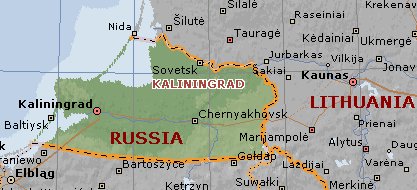Creative Cartography I

This is a map of the Kaliningrad Oblast of Russia. This area is where my family name comes from, but it was called Prussia when my great grandfather left in the 19th century to find his fortune and his wife in Berlin, before coming to the US. He spoke both Prussian, which was a Baltic language, and German.
As a result of World War II the area became part of the Soviet Union, and was assigned to the Russian SFSR.
It is currently part of the country of Russia. The water to the West is the Baltic Sea. The country to the South is Poland. As the map shows, Lithuania is to the north and East.
To drive to Kaliningrad from the rest of Russia you have to pass through two other countries. The most direct route would be through Belarus, and then Lithuania, but Russia kept it because it was a “prize” of the Great Patriotic War, and the Poles and Lithuanians were not considered helpful in that endeavor.
There was and is a lot of military in the area to remind people of certain possibilities, despite the expense of maintaining the area, and the lack of any historic ties to Russia.



































4 comments
If memory serves, the Russians also wanted it because it was felt that East Prussia was the source of much of the militaristic tradition in Prussia proper, which later spread to the whole of Germany (to parrot the old Sonderweg hypothesis, now utterly discredited). It was also the base of operations for the Teutonic Knights of the 13th century, never popular in Russia since the days of Алекса́ндр Не́вский and the Ледовое побоище in 1242–and especially after Eisenstein made that battle the centerpiece of his 1938 hagiography of Nevskii. And lastly, since it was the birthplace of Immanuel Kant, they figured they might be able to control (or at least downplay) one of the major influences on German culture.
The Teutonic Knights established their “colony” as hospital, in the earliest sense of the term, for knights returning from the Crusades and as an outpost for Christianity in “pagan lands”, the Lithuanians came to Christianity very late, and these were the years of the Horde. The knights healed and went about doing what knights do – fight and conquer territory. Their presence cut off access to the Baltic for the few Russian city states that weren’t under control of the Horde and shut down all trade.
The Baltic states were a constant thorn in the side of the re-born Russia after the rise of Moscow. The Livonian War was the real source of many of the problems of the rule of the first Tsar, and much of his “bad press”, being referred to as Ivan the Terrible.
It has great historical significance, but little practical value, which a touchstone for a lot of the things that cause stupid reactions among Slavs.
It was actually a provincial backwater when my great-grandfather left, as the name and title was taken by the Nuremburg branch of the Hohenzollerns who were much happier in their holdings in Brandenburg. My great-grandfather made the point often enough that he was a real Prussian, not a pretender.
After World War II the Poles were definitely not going to allow any Germans to their East, so the area was definitely forfeit, but it would have made more sense to carve a corridor for the Belarus SSR, which would have given them a Baltic port and punished Lithuania. Putting it under Russia made no real sense and created problems.
All of the “Germans” in the area were moved. Those who were unable to go to the West were shipped to the East, far to the East.
This was a decision made by a Soviet government, headed by a Georgian, so the decision to tie the area to Russia, wasn’t ethnic in nature, but political.
Definitely backwater. East Prussia was firmly in the hands of the Junkers, who kept it rural, agrarian, and ruled with iron hands. They were among Bismarck’s leading opponents when he tried to consolidate industrialization and modernization in the newly united Reich. Though I believe it was Bismarck who once observed that if the world were to end today, the folks in Mecklenburg (nearer Berlin, but still regarded as a backwater) wouldn’t find out about it for a couple of months.
My grandfather was constantly looking for the most modern and efficient ways of farming, and was the first person in the area to install new equipment. He often made the point that his father complained of living in a “museum” in the old country, where nothing ever changed.
My great-grandmother was from Berlin, and she was extremely acclimated to change and new devices, but she had a bit of an attitude about the superiority of German made goods. She lived with my grandparents, and was not exactly a joy to be around.
The Junkers kept claiming to be tied to the original knights, but that is highly unlikely.
They joined the military because they couldn’t make a living from their “estates”. The soil was thin, the ground was rocky, and the weather was miserable, but other than those little problems it was a paradise. Things haven’t gotten better, and it really doesn’t have any real value as anything other than a threat from all of the military there.